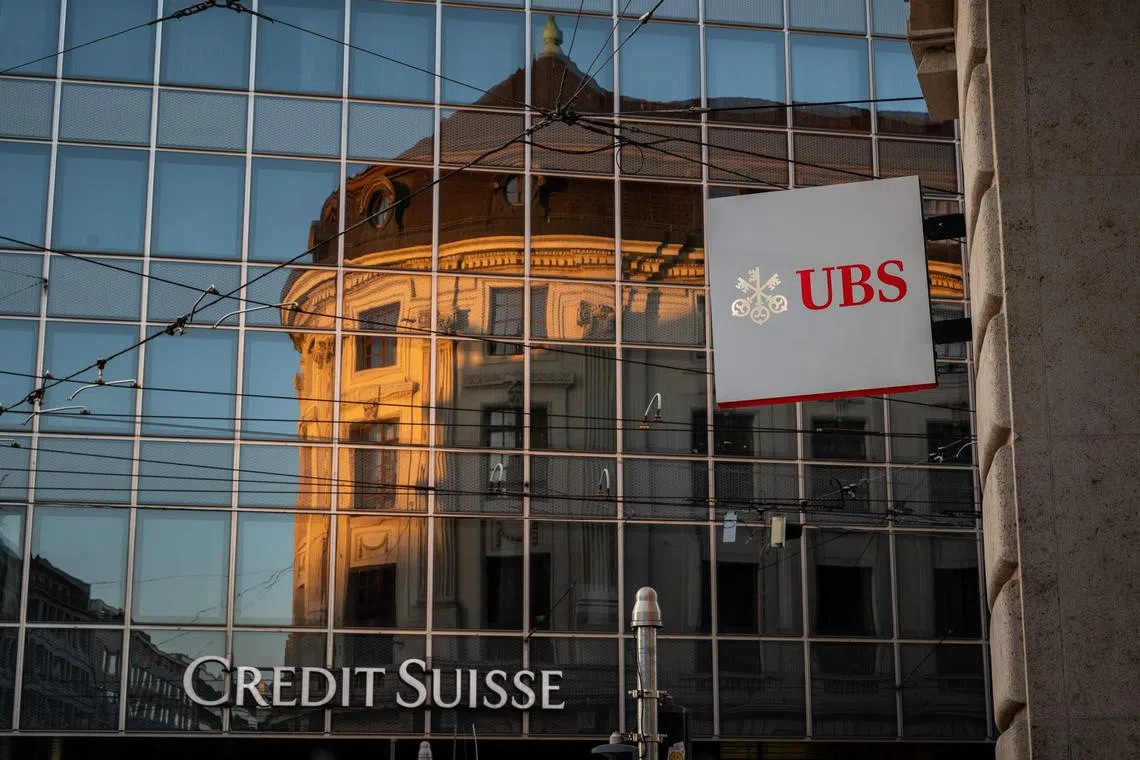UBS inherits legacy of legal headaches in Credit Suisse takeover
Sign up now: Get ST's newsletters delivered to your inbox

Legal issues are among the key unknowns as UBS and Credit Suisse, Switzerland’s two biggest banks, merge.
PHOTO: AFP
Follow topic:
GENEVA – When UBS integrates Credit Suisse in the coming months,
The inconvenient truth for UBS is that the vetting will not do anything for the legal headaches already working their way through courts in Switzerland and abroad, and the clean-up will fall to UBS chief legal counsel Barbara Levi once the deal closes – expected by June.
The long list of unresolved cases spans an embarrassing criminal conviction for facilitating a Bulgarian cocaine trafficker’s money laundering to a half-a-billion dollar settlement in a bribery scandal related to a tuna fishing fleet in Mozambique.
All told, the civil liabilities could reach into the billions, and then there are the criminal risks as well. The deal itself has also raised new issues as owners of at least US$6 billion (S$8 billion) of bonds fight against getting wiped out.
While the price UBS is paying is low enough to allow the bank to absorb unexpected exposure, legal issues are among the key unknowns as Switzerland’s two biggest banks merge. Spokesmen for both companies declined to comment on the status of key cases or how they will evolve once the deal closes.
The litany of Credit Suisse issues comes as UBS winds down its own backlog, including an expected agreement with the United States authorities over residential mortgage-backed securities that date from the 2008 financial crisis. In France, UBS has lodged a top court appeal following a €1.8 billion (S$2.65 billion) criminal conviction in a tax case in 2021.
Here is where things stand in some key cases:
‘Tuna’ bribes
Starting in London in September, UBS’ legal team could face a 13-week civil trial over Credit Suisse’s role in the US$2 billion “tuna bond” scandal.
The loans were for three maritime projects including a tuna fishing fleet and a surveillance operation to protect Mozambique’s coastline against pirates. Three former Credit Suisse bankers were convicted in the US for accepting bribes.
The authorities in Mozambique accuse Credit Suisse of ignoring multiple red flags when arranging the loans to state-backed companies. The Swiss lender denies those claims. In this case too, there is the possibility UBS chooses to settle to avoid the embarrassment of a lengthy London trial.
US entanglements
In late March – just days after the forced sale to UBS – the US Senate’s finance committee said it had uncovered “major violations” of Credit Suisse’s US$2.6 billion plea deal
Credit Suisse has said it does not tolerate tax evasion and is “actively cooperating” with the Justice Department. It is not clear what penalties could result from the allegations.
The Swiss lender also suffered a legal setback in March. A New Jersey court rejected its bid to defeat class-action status in a US$1.8 billion lawsuit from investors in its VelocityShares Daily Inverse VIX Short Term exchange-traded notes. The potential cost of losing at trial makes a settlement likely and in the range of US$500 million, according to Mr Elliott Stein, Bloomberg Intelligence’s senior litigation analyst.
In another US issue, Credit Suisse faces private civil litigation that concerns some US$2 billion in claims related to its role in selling residential mortgage-backed securities, which contributed to the 2008 financial crisis. Recent court decisions point to a potential settlement in the range of US$400 million to US$800 million, according to Mr Stein.
Russian sanctions probe
UBS and Credit Suisse are connected on at least one issue. On March 23 – just four days after the shotgun wedding was announced – it emerged that both were among those subpoenaed by the Justice Department in a probe into whether financial professionals helped Russian oligarchs evade sanctions.
The US inquiries are focused on identifying staff that dealt with sanctioned clients and how those clients were vetted over the past several years. Before fresh sanctions were imposed following President Vladimir Putin’s invasion of Ukraine, Credit Suisse was a magnet for wealthy Russians. At its peak, the bank managed more than US$60 billion for clients from the country and was still managing about US$33 billion as recently as May 2022.
Bond backlash
In addition to legacy legal issues, the combination has raised new ones. Some disgruntled owners of US$17 billion in Credit Suisse bonds that were wiped out
This might be merely a nuisance for UBS, because the risk was clearly stated in the offering. Also, any litigation has to be brought under Swiss law, cutting off the potential for New York firms to sue in the US financial capital.
“These lawsuits likely face low odds,” said Mr Stein. “My reading of the bond documentation is that it would be very hard for bondholders to succeed on the merits.”
BLOOMBERG

